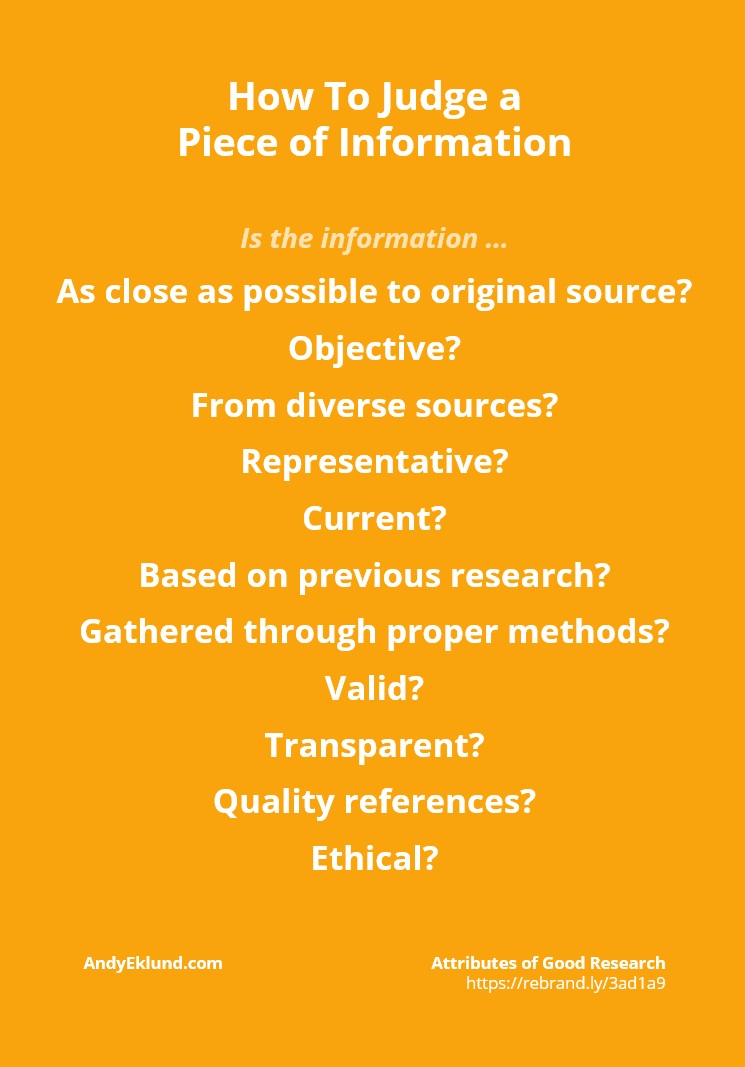When conducting research, or simply looking at a piece of information, you must know the attributes of “good research.”
While it sounds like an easy question, it’s anything but.
Given the state of the world – where information, disinformation and misinformation often co-exist – you and I have probably already realised that discussing or debating a particular “fact” can be an increasingly emotional discussion, not just a rational question.
But, at the same time, I have a lot of students and workshop participants who still need to conduct research for work projects, and they need a bit of guidance on how to judge a piece of information.
Please, this post isn’t meant to be the definitive answer.
But, from doing my own research over the years, I create this list of eleven attributes of ‘good’ research framed as questions. Use them if they are helpful to you. Adapt and edit them to suit your situation as long as you don’t use them to confirm your bias.
(See As a Final Point far below …)
Attributes of Good Research
Is the information …
- As close as possible to the original source?
- Objective?
- From a cross section of diverse sources?
- Representative?
- Current?
- Based on previous research?
- Gathered through systematic (reproducible) and proper data methods?
- Valid?
- Transparent?
- Quality references?
- Ethical?
Here is more detail on each research attribute above.
As close as possible to the original source?
Were you able to get the information directly from the original source (the person)?
Every step removed from the original source adds bias. In other words (or, as much as possible), go talk to the person directly who has the information you need.
Objective?
How much bias, stereotypes, prejudice or motives are involved?
This is particularly true of the source itself. Sometimes a way to determine bias is to compare one piece of information to another from a different source, perhaps from an ‘opposite’ perspective. By comparing the two sources, ask yourself why the information might be different. One (or both) of the sources may have an agenda.
Cross section of diverse sources?
Can the information be confirmed from a cross-section of diverse sources?
And, let me state for the record: diverse to both you and your decision maker. Do everything possible to ensure you leave bias out of any business decision-making.
Representative?
Were enough people, and the right type of people, consulted or interviewed?
Current?
How recent is the information?
Nothing wrong with old information, but check to see if any part has been updated, or corrected. If it hasn’t why hasn’t it? If it has changed, why? What variables have changed if the new information is different?
Gathered through systematic (repeatable) and proper data methods?
Could (or has) the information still be accurate if it was re-created “as is” a second time?
Valid?
Was the way it was gathered and measured trustworthy? Does it measure what it says it measures?
Transparent?
Was the research conducted honestly, fairly and openly?
Quality references?
Does the background of the author or publisher stand up to public scrutiny?
Ethical?
Did the people whom the information was gathered know they were part of a research study?
Was any part of the information falsified, fabricated or plagiarised?
Check there was no deliberate bias to twist the conclusion(s) to suit the situation.
If Research Is New to You ...
Easily, this is one of the best singular documents I’ve ever found on conducting research comes from the Victorian TAFE Association.
Among other good detail and advice, it covers the basic eight “distinctive and overalpping” features of Appliled Research.
- Defining the problem
- Designing a research plan
- Obtaining approval
- Collecting evidence
- Analysing data
- Testing and recording findings
- Reviewing quality
- Reporting and applying results
Click on this link to download the 72-page guide.
And, as a final point, one of my college professors gave me this good advice.
Spend half of the research time trying to prove myself wrong, not just only trying to prove myself right.
What other criteria have you used to decide the attributes of good research? How did you decide a piece of information was useful to avoid bias in decision making? Please add your thoughts and comments below.



No comment yet, add your voice below!